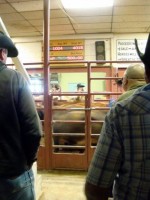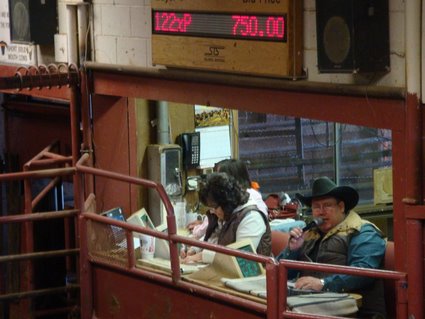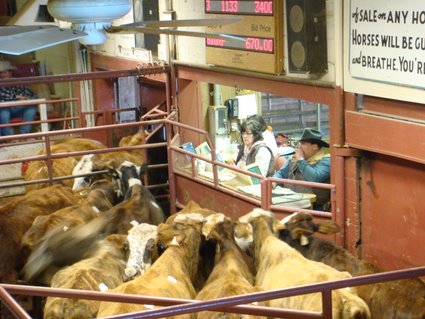I pulled in, as it’s well known that cafes near livestock auctions are good. Or at least it seems like they should be—even though of course they are not slaughtering the cow right out back, like you imagine.
The parking lot was packed, but it didn’t occur to me there was an auction in session until after I’d wandered through the cafe, cautiously nosed into the main building itself, perused the ads for ranch horses, and then heard the buzz of activity through the swinging doors behind me.
 I stepped through and found myself in a short concrete hall leading up to the front, below the rings of seats. I stood there a bit, trying to decide whether I was welcome or not. When it became clear that the place was not going to fall silent, and the entire crowd of cowboy-hatted men was not going to swivel around to stare at me, I sidled in and took a seat, all casual-like. After a while, I took a little sound recording of the auction:
I stepped through and found myself in a short concrete hall leading up to the front, below the rings of seats. I stood there a bit, trying to decide whether I was welcome or not. When it became clear that the place was not going to fall silent, and the entire crowd of cowboy-hatted men was not going to swivel around to stare at me, I sidled in and took a seat, all casual-like. After a while, I took a little sound recording of the auction:
And after a bit more, I started taking some photos. When I eventually moved up in the bleachers for a better vantage point, a handsome younger rancher leaned over and said, “Hey, you’re one of those animal-rights people, aren’t you?” Best pickup line ever.
I said no, I wasn’t, but I was curious about where my meat came from. He went on to explain the whole system—how these cattle weren’t being sold for slaughter, but between ranchers to round out their herds. Ranchers running short of grass were selling extra head to those whose sections were just now getting green. He clued me in to the various codes, signals and marks on the cattle—it felt a lot like learning the basics of a new sport.
He also explained, as a side note, that they used to auction horses for slaughter here, but that got banned—and as a result, now New Mexico is infested with horses that have been set loose because their owners couldn’t afford to keep them and had no other way to get rid of them. I’d always suspected there was another side to the ‘protect the wild horses’ story, but had never heard it.
As I left, I asked the rancher for his name or a card. But he politely declined. He still thought I was one of those animal-rights people after all.
I’m running a contest all this week, for free copies of my Santa Fe guidebook–enter here.

